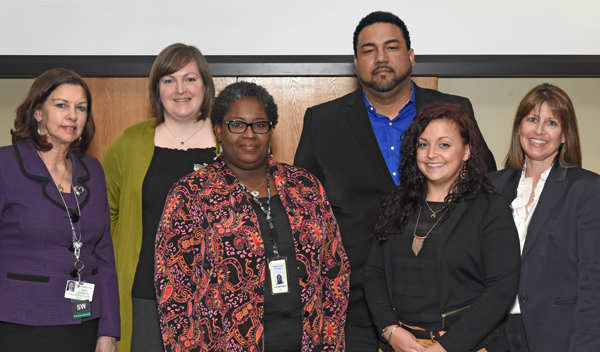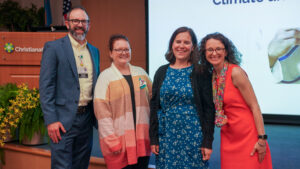When victims of crime are seen in the Emergency Department or physician offices, there are several ways that health providers can help them make contact with organizations that offer counseling, financial assistance and immediate shelter. At the Community Partnership luncheon at the Gateway Conference Center in April, representatives of social service programs explained how they help crime victims and shared insights on the needs of victims.
“It’s very important to talk about what we offer, because we want to be connected to the Emergency Department as a direct way of reaching crime victims who need our support,” said Stephanie Hamilton, victim services coordinator of the Wilmington Police Department. Her office served close to 1,300 crime victims last year.
The monthly meeting of the Community Partnership is an opportunity for local agencies to share information about programs — such as crime victim services — with staff from numerous departments in Christiana Care, along with other social services providers. The Community Partnership meetings are in their third year and are organized by Linda Brittingham, LCSW, BCD, director of the Department of Social Work, and her staff. Attendees include outreach workers from government service agencies and staff from nonprofits such as Child Inc., the Ministry of Caring and United Way of Delaware.
“Christiana Care has provided a forum for us to talk, learn about community resources and get to know each other,” said Eric Harris, executive director of Sojourners’ Place, a long-term program for the homeless. “Because of the relationships we arebuilding, it is easier for all of us to do what we do.”
Christiana Care President and CEO Janice E. Nevin, M.D., MPH, said the Community Partnership is among her favorite programs. “If you look at our mission at Christiana Care, we talk about serving our neighbors as respectful, expert, caring partners in their health, and we know that is something we cannot do alone,” Dr. Nevin said. “Certainly we bring the expertise that comes with health care and health care delivery. But when it comes to health it’s the partnerships we have with you in the community that ultimately provide our neighbors with the value that they are looking for in how they live. I am deeply grateful for all the tremendous work you do.”
A 2013 report on the Community Health Needs Assessment for Wilmington suggested that Christiana Care Health Care System has an important role to play in facilitating community education and coordinating with local organizations to reach needy and underserved populations and neighborhoods.
“Among our community’s neediest populations — and perhaps the least visible — are victims of crime,” said Dr. Nevin. “Their wounds are often ones we cannot see but that indeed affect their health — even their ability to access health care — in detrimental ways.”
Christiana Care’s involvement with the Community Partnership grew out of a recognition, three years ago, that many homeless people were arriving at the Wilmington Hospital Emergency Department in cold weather seeking help. Most didn’t require emergency medical care. They needed help with social services such as shelter, food and clothing. But police and other public-service agencies did not have a coordinated way to meet those needs.
Brittingham worked to improve communication with government agencies and providers of social services, convening the Community Partnership and beginning regular meetings. As a result of the partnership, the number of people using the Emergency Department for social needs has dropped 83 percent.
“We’re grateful for the role that Christiana Care has played in bringing us together,” said Hamilton of the Wilmington Police Department. “The social workers there are great to work with.”
Among those speaking about their programs at the April partnership meeting, were:
- Lisa Borin Ogden, executive director of the Delaware Victims’ Compensation Assistance Program.
- Melissa Pleasanton, a transitional counselor at Child Inc., which offers shelters for victims of domestic violence.
- Pedro Torres, an advocate for victims of crime with the Latin American Community Center.
- Tonia Bell-Delgado, program coordinator of Adult Crime Victim Services (for residents of New Castle County 50 and older), which is part of the Delaware Center for Justice.
“As partners, it’s important for us to know about each other’s resources so we can fully help victims,” said Pleasanton.
Victim safety and empowerment are primary concerns for each of the organizations. And in Delaware there is a Victims’ Bill of
Rights, signed into law in 1992, under which victims are entitled to participate in all major phases of the criminal case process and to be informed about services for victims.
Ogden pointed out that agencies work hand-in-hand, citing the example of a victim of domestic violence. On a Saturday evening, a victim might go the Emergency Department for medical assistance and be referred to the Domestic Violence Hotline (302-762-6110). Through the hotline, the victim could find safety in a shelter run by Child Inc. and use the program’s case-management services. While in the shelter, the victim would be able to speak to a police-based advocate and file an Order for Protection from Abuse or press other charges. She might also make use of the Victims’ Compensation Assistance Program, which helps with medical bills and up to $3,000 in lost income. The program also provides assistance with a security deposit and the first month’s rent on a new place to live.
“In a case like this, we haven’t fixed everything or taken away the pain,” said Ogden. “But the combination of our efforts is the opportunity for a new life.”



